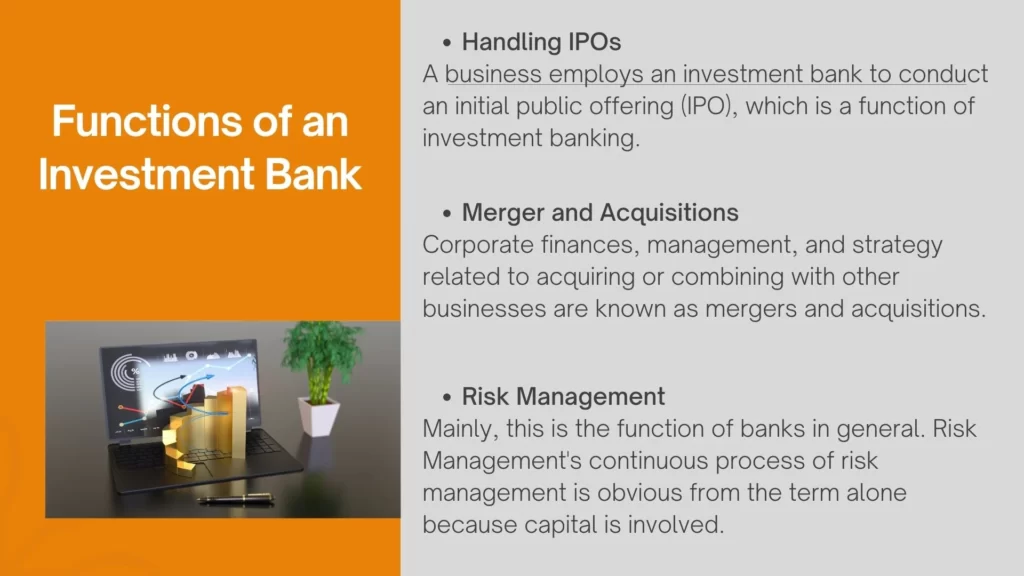Introduction
Before moving on to The function of banks Let’s have a quick introduction to Investment banking.
Investment banking is a branch of banking that coordinates massive, intricate financial deals like mergers or the underwriting of initial public offerings (IPOs). In addition to underwriting the issuance of new securities for a company, municipality, or other entity, these banks may raise money for businesses in a number of other ways. This is the function of a bank when we talk about Investment banking. Additionally, investment banks offer guidance during mergers, purchases, and reorganizations.
Investment financiers are professionals who are acutely aware of the state of the market for investments. They assist their clients in navigating the difficult high finance environment.
The main focus of the function of bank is generating capital for businesses, governments, and other organizations.
For all kinds of corporations, investment banking operations include the underwriting of new debt and equity securities. Additionally, investment banks will help with reorganizations, mergers, and acquisitions, as well as broker trades for companies and individual investors.
The function of banks in Investment banking also helps with the sale of securities, mergers and acquisitions, reorganizations, and broker trades for institutions and individual investors. They also underwrite new debt and equity securities for all kinds of businesses.
Investment banks advise issuers on the offering and placement of shares as well. The largest are Goldman Sachs, Morgan Stanley, JPMorgan Chase, Bank of America Merrill Lynch, and Deutsche Bank. Numerous large investment banking systems are subsidiaries or affiliates of bigger banking organizations.
In short, the function of bank in Investment banking is generally to support significant, complex financial deals. If the investment banker’s client is contemplating an acquisition, merger, or sale, they might offer guidance on how much a company is worth and the best way to arrange a transaction.
The duties of investment banks may also include preparing the paperwork for the U.S. Securities and Exchange Commission (SEC) required for a company to go public and issuing securities as a means of collecting capital for the client groups.
By identifying project risks upfront, investment bankers help their customers save time and money. Businesses and institutions turn to investment banks for advice on how to best plan their development because, in theory, investment bankers are experts who have their finger on the pulse of the current investing climate.
What does an Investment bank do?

The function of bank as an Investment bank is to help with financial deals. If the investment banker’s client is contemplating an acquisition, merger, or sale, they might offer guidance on how much a company is worth and the best way to arrange a transaction. Additionally, the function of bank for an investment bank can be that they might issue securities to raise money for client groups and produce the paperwork required by the US Securities and Exchange Commission (SEC) for a business to go public.
Revenue Model of Investment Banks
Underwriting commissions are paid to investment institutions. The advisory fees they charge customers for managing their assets, which can be in the millions of dollars, are another source of income for them. Their primary sources of income, according to SEC filings, are brokerage fees and proprietary trading.
The income generated by the function of banks mainly comprises commissions. Investment banks made money by securitizing debt, such as mortgage-backed securities, prior to the financial crisis of 2007–2008; however, the collapse of this asset class led to tighter control from the U.S. government, which restricted speculative trading.
Largest Investment Banks
Several cities, including New York, London, Hong Kong, and Tokyo, are regarded as major hubs for the worldwide investment banking industry. The biggest investment banks in the globe include Citigroup, Goldman Sachs, Bank of America, Morgan Stanley, and JPMorgan Chase.
When it comes to investment banks, size counts. The biggest investment banks are regarded as being a part of the bulge bracket, a small collection of extremely large businesses that dominate the majority of global financial transactions. Middle-market or “boutique” banks are the term used to describe smaller financial banks.
Regulation and Investment Banking

After the 1929 stock market crash caused numerous bank failures, Congress enacted the Glass-Steagall Act in 1933. The legislation was designed to keep commercial and investment banking separate. It was thought to be extremely dangerous to combine commercial and investment banking operations, which could have made the 1929 crash worse.
This is due to the fact that investors raced to withdraw their money from banks in order to meet margin calls and for other reasons after the stock market crashed, but some banks were unable to comply because they had also invested their clients’ money in the stock market.
Prior to the passage of Glass-Steagall, banks had the ability to use regular depositors’ money for speculative ventures like investing in the stock market. Banks increased their speculative positions as these operations became more profitable, ultimately placing the money of depositors at risk.
The Glass-Steagall Act was ultimately repealed by Congress in 1999 because some in the financial industry thought its requirements were too onerous. Thus, the distinction between commercial and financial banks was abolished by the Gramm-Leach-Bliley Act of 1999. Most sizable banks have resumed combined investment and business banking activities since the repeal.
When a company wishes to issue stock or bonds, the function of bank as an investment bank is that it essentially acts as a middleman between the company and the investors. The investment bank offers assistance in navigating regulatory requirements and pricing financial assets to maximize profit.
The function of bank as an Investment bank also includes frequently purchasing all or a large portion of a company’s shares directly from the business when it conducts its initial public offering (IPO). The investment bank will then sell the shares on the market in place of the business launching the IPO. The business itself has it much easier as a result because the IPO is essentially contracted out to the investment bank.
Furthermore, the investment bank will benefit because it will typically mark up the price of its shares over what it originally paid for the function of banks. It also assumes a significant quantity of risk by doing so. The investment bank can lose money on the deal if it turns out that it overvalued the stock because, in this scenario, it will frequently have to sell the stock for less than it originally paid for it. Experienced analysts use their expertise to correctly price the stock as best they can.
Role of Investment Bankers

Investment banks hire professionals who assist businesses, governments, and other organizations in the planning and management of large projects. By identifying project risks before the client moves forward, these professionals help their clients save time and money. Theoretically, investment bankers ought to be industry specialists with a pulse on the state of the market for investments. Investment bankers use their knowledge to customise their suggestions for the current economic climate.
Definition of an Initial Public Offering (IPO)
An initial public offering (IPO) is the process of selling fresh shares of a private company to the general public. A business can collect funds from the general public by issuing public shares. For a company to conduct an IPO, the SEC and exchange criteria must be met. To underwrite their IPOs, businesses employ financial banks. Every step of the IPO process, including due research, document preparation, filing, marketing, and issuance, is handled by the underwriters.
Functions of an Investment Bank

The function of Bank and that too of an Investment bank can be vast. Following are the Top 7 functions of an Investment bank
- Handling IPOs
A business employs an investment bank to conduct an initial public offering (IPO), which is a function of investment banking. Investment banks are hired by businesses prior to the IPO. The function of bank is that this bank was selected based on a variety of factors, including distribution channels, study quality, market reputation, and industrial experience.
A few banks perform underwriting, acting as a middleman between investors and the businesses issuing the securities.
The underwriting agreement is where the investment bank sorts out the IPO’s financial specifics.
After that, the business files with the SEC both the registration statement and the underwriting agreement. After the SEC has approved the IPO, the underwriter and issuing business determine the offer price and the number of shares which will be sold.
As soon as the stock is issued, the function of bank performs aftermarket stabilization, during which it evaluates aftermarket stabilization and establishes a market for the stock. The transition to the market rivalry is the last phase. The bank gives an estimate of the value and profits of the issuing business after 25 days.
Under Investment banking one of the function of bank is IPO. An IPO is listed in a stock market with the aid of an investment bank. In exchange, a business pays a commission to this bank.
Merger and Acquisitions
Corporate finances, management, and strategy related to acquiring or combining with other businesses are known as mergers and acquisitions. In exchange, an investment firm charges M&A fees. A bank is employed by an M&A business for these transactions. Investment banks go through the following stages for M&A.
In M&A transactions, an investment bank plays both seller representation and buyer representation responsibilities. The valuation of a business plays a crucial role in M&A. The function of bank helps in determining a company’s true market worth.
Investment banks develop their M&A strategies for two businesses. The investment bank also handles a company’s financial planning because M & M&A businesses require a lot of money. It aids a business in obtaining capital for M & A. Issuing new assets to the market is the primary responsibility.
Once an appropriate target has been identified, this investment banking function aids a small firm in self-projection and merger planning. It contributes to the merger’s achievement, which is accomplished with an investment bank’s assistance.
Risk Management
Mainly, this is the function of bank in general. Risk Management’s continuous process of risk management is obvious from the term alone because capital is involved. It established a cap to prevent trading losses. A business benefits from investment banks in the following ways. Investment banks assist a business in managing financial risk by providing loans, liquidity, and other services. This bank assists a business in identifying the loss region.Banks opt for stock exchanges for dealing as a result of this credit risk-control credit risk investment’s counterparty distribution strategy.
There are numerous risks that an investment bank internally monitors, including company risk, investment risk, legal & compliance risk, and operational risk.
Since it identifies risks and suggests ways to control them, investment banks practice risk management at every level.
Proper Research
One of the most crucial investment banking duties is this equity research function. This study aids in giving the business a rating that investors can use to guide their financial decisions. Based on a company’s rating, research reports indicate whether to purchase, sell, or hold a stock. One can determine the company’s value through this.
Analyzing and contrasting various business reports and performance reports is how research is conducted. The function of bank is research, which can take many different forms, including stock research, fixed-income research, macroeconomic research, qualitative research, etc. Investment banks provide their customers with these reports, enabling investors to make money through trading and sales.
Derivatives Structuring
A lot of risks are involved because derivatives products have a high rate of return and a decent margin. These derivatives are created by investment banks using a strategy based on single and numerous securities. Investment banks require a strong technical staff to work on such a complex derivatives structure for this investment banking role, which is structuring derivatives.
Securities created by investment banks often include various derivatives choices. Designing such a product is primarily done to draw in financiers and boost profit margins. This bank enhances it with features, such as shares. The function of bank is to ensure profitability. There is yet another derivative on the market that aids in giving investors a respectable yield.
Merchant Banking
One of the investment bank’s personal operations is its investment banking division, where the bank also provides consulting to its clients. It serves as a business’s finance engineer.
They offer advice on managerial, legal, financial, and business issues. The following are the features of merchant banking obtaining money for a customer, broker in the stock market, project administration, Money-market activities, Leasing assistance, portfolio administration, managing obtaining government approval for industrial initiatives, managing a company’s societal issues and Special support for entrepreneurs and tiny businesses
Investment banks offer their customers a wide range of additional services. Investors are charged consulting costs by this bank.
Investment management
Primarily, The function of bank as an investment bank is to assist the investor in selecting, managing, and trading a variety of securities. Investment banks compile reports based on business performance and make financial security decisions using this information. Investment guidance is based on the client’s goal, level of risk tolerance, the amount invested, and the time frame.
the function of bank of Investment management is divided into Private clients, Private wealth management, and wealth management based on the customer group. Here, an investment bank oversees a customer portfolio and advises investors on whether to purchase, sell, or hold stocks.
Skills Required for Investment Banking

A lot of financial modelling and assessment are necessary. To advise their customers and close deals, whether for underwriting or M&A activity, investment banking analysts and associates invest a lot of time in Excel building financial models and utilizing various valuation techniques.
Several necessary investment banking abilities are listed below.
Financial modelling: Financial modelling is an abstraction of a real company made with spreadsheets that aid in figuring out future cash flows, financing requirements, whether or not to invest in the company, and valuation. Models are also used to figure out whether or not asset acquisitions and the creation of new assets are feasible.
Relationship Management
Relationship managers work on the investment management staff at an investment bank.Here, a team of approachable and client-facing professionals works together to provide specialized advice to the bank’s client network, which includes everyone from extremely wealthy (super-wealthy) people to governments to financial institutions like trusts, pension funds, and insurance companies. The team’s private wealth managers usually work with high-net-worth individuals, as well as the businesses and families they are connected to.
A single relationship manager is frequently assigned to a client when they establish an account with an investment bank or get in touch with them for services. The goal of a relationship manager is to form strong bonds with each of their customers.
Business valuation
The process of determining the economic worth of an entire company or business unit is known as business valuation. The reasonable worth of a business can be determined using business valuation for a number of reasons, such as sale price, partner ownership, taxation, and even divorce proceedings. Owners frequently consult experienced business evaluators for an impartial opinion of their company’s worth.
Helping in Negotiation
Without the help of a third party, negotiation is the process by which parties come to an agreement and comprehend one another.
Benefits of Investment Banking

Investment banking assists large companies in a variety of ways so they can make crucial financial decisions and reap the greatest financial benefits, as was previously stated. Investment banks are popular financial institutions with companies and even governments as a result. In this respect, we can say that investment banking and investment banks offer a variety of benefits to major businesses and organizations.
These are a few of the benefits along with the function of Bank:
- Investment banks effectively manage their clientele and give them crucial details about the rewards and dangers of their investments in other companies or organizations.
- These banks serve as a go-between for the business and the investor, guaranteeing an increase in capital by aiding in big-ticket transactions like mergers and acquisitions.
- To ensure that the client’s money is placed in a secure location and minimize the risks involved with the deal or project, it undertakes in-depth research on the deal and project that its client plans to pursue.
Difference between the Function of Bank (Investment and Commercial)
A bank is typically divided into two main classes: Commercial banks and Investment banks, depending on the sort of work it performs. The majority of the general public immediately thinks of commercial banks when they hear the term bank. Commercial banks serve the general public and are used for everyday activities like client loans and client deposits. Investors use investment banking. Capital financing is done through investment banking. Few institutions combine commercial and investment banking services.
- Commercial banks serve a wide range of clients, including the general public and companies, by accepting deposits, disbursing loans, protecting assets, and working with them. The function of Bank in terms of Commercial banks is crucial as they are more public-oriented.On the other side, Investment bank and the function of bank revolves around offering services to big businesses and institutional investors.
- Investment banking is likely the best option if you want a high salary and are prepared to take a lengthy, difficult road. Commercial banking may be a better match if you want to have a little more work-life balance and enjoy more casual social interactions with clients.
- Commercial banks and investment banks offer various services and focus on various financial pursuits. Investment banks are responsible for broker trades, mergers and acquisitions, reorganizations, and the underwriting of new debt and equity instruments. Although some combine functions, the majority of financial services companies run as either investment banks or commercial banks.
Conclusion
Governments and large corporations alike depend on investment banks to raise money in today’s mixed economies. Investment institutions have historically matched buyers and sellers of securities. To a market, this is referred to as “adding liquidity.”Investment managers are compensated for their function as middlemen.
Businesses expand more rapidly and financial development is more effective when producers and savers are matched. There is some disagreement over the reasons why financial intermediation costs increased for the majority of the 20th century. During the same time frame, most other business expenses decreased, but the proportion of financial transactions handled by investment bankers increased. This appears to show that the sector lost efficiency.
Hope you like this blog” the function of bank” and comment down you views regarding it.
Frequently Asked Questions
The function of Bank in India are as follows
- Deposit payments from the general population
- Offer a tool for demand withdrawal
- Lending institution
- Money Exchange
- Problem with draughts
- Give clients access to lockers
- Handling currency transactions
Mainly the function of Bank is that bank gives money by funding advances on current accounts for customers, providing instalment loans, and investing in marketable debt securities, among other methods. The function of bank offers a variety of payment services, and most companies and people view having a bank account as essential.
In a market, The function of Bank is to accept deposits.
- Customers deposit money into banks, and in exchange for retaining their money in the bank, they receive interest
- Keeping money secure
- Making funds available
- giving credit-related services
In short,the function of Bank is discussed in the 5 steps below
- taking money
- approving advances and debts
- Agency activities
- discounting trade bills
- generating credit
Implementing monetary policy and managing the money supply is the function of Bank, which are frequently tasked with preserving low inflation and steady GDP development.
The function of bank in secondary terms relates to the banking activities of money transfers, the purchase and sale of securities, consulting services, etc., as well as general utility services like letters of credit and locker facilities. These are also referred to as qualitative financial services.
These include credit unions, commercial banks, and thrifts (which also include savings and loan organizations and savings banks).
Cash, credit, and other financial activities are handled by the banking sector. Banks offer a Secure Location to Store Unused Credit and Cash. The function of Bank is to provide bank, savings, and certificate of deposit accounts.
The function of Bank are
- to issue traveller’s checks, letters of credit, etc.
- offering safe deposit vaults or lockers, assuming safe custody of valuables, essential papers, and securities.
- offering customers the ability to conduct foreign currency transactions.
The followings are the eight key roles or the function of Bank
(1) Regulating financial liquidity
(2) Banker, Agent and Advisor to Government
(3) Custodian of Cash Reserves
(4) Custodian of Foreign Balances
(5) Lender of Last Resort
(6) Clearing House
(7) Controller of Credit and
(8) Protection of Depositor’s Interest





